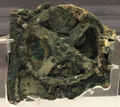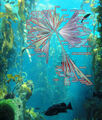Poseidon (nonfiction): Difference between revisions
No edit summary |
No edit summary |
||
| (14 intermediate revisions by the same user not shown) | |||
| Line 1: | Line 1: | ||
[[File:Poseidon_Penteskouphia.jpg|thumb| Poseidon holding a trident. Corinthian plaque, 550–525 BC. From Penteskouphia.]]'''Poseidon''' ( | [[File:Poseidon_Penteskouphia.jpg|thumb| Poseidon holding a trident. Corinthian plaque, 550–525 BC. From Penteskouphia.]]'''Poseidon''' (Greek: Ποσειδῶν, pronounced [pose͜edɔ́͜ɔn]) was one of the twelve Olympian deities of the pantheon in Greek mythology. | ||
His main domain was the ocean, and he is called the "God of the Sea". Additionally, he is referred to as "Earth-Shaker" due to his role in causing earthquakes, and has been called the "tamer of horses". | |||
The name of the sea-god ''Nethuns'' in Etruscan was adopted in Latin for ''Neptune'' in Roman mythology; both were sea gods analogous to Poseidon. | |||
Linear B tablets show that Poseidon was venerated at Pylos and Thebes in pre-Olympian Bronze Age Greece as a chief deity, but he was integrated into the Olympian gods as the brother of Zeus and Hades. | |||
== In the News == | |||
<gallery mode="traditional"> | |||
File:Antikythera mechanism (fragment A front).jpg|link=Antikythera Team|[[Antikythera Team]] investigating threat on Poseidon's life. | |||
File:Aquaman1_v1.jpg|link=Aquaman (nonfiction)|''[[Aquaman]]'', vol. 1, #1: cover art by Nick Cardy. From the personal collection of [[Neptune Slaughter]]. | |||
File:Red-Limned Sea Quetzalcoatl.jpg|link=Sea Quetzalcoatl|Red-limned [[Sea Quetzalcoatl]] disguised as Tree of Life. | |||
File:Grave of the pirate Olivier Levasseurs.jpg|Grave of the pirate Olivier Levasseurs, with cannon to ward of scrimshaw ghosts. | |||
File:Cinnamon_pirate_flag_800x600.jpg|link=Cinnamon Jack (pirate)|[[Cinnamon Jack (pirate)|Cinnamon Jack]] the Pirate King has unfinished business with Poseidon. | |||
</gallery> | |||
== Fiction cross-reference == | |||
* [[Antikythera Team]] | |||
* [[Neptune Slaughter]] | |||
== Nonfiction cross-reference == | == Nonfiction cross-reference == | ||
| Line 17: | Line 26: | ||
* [[Aquaman (nonfiction)]] | * [[Aquaman (nonfiction)]] | ||
* [[Linear B tablets (nonfiction)]] | * [[Linear B tablets (nonfiction)]] | ||
* [[Taraxippus (nonfiction)]] - a presence, variously identified as a ghost or dangerous site, blamed for frightening horses at hippodromes throughout Greece. | |||
External links: | |||
* [http://wiki.karljones.com/index.php?title=Poseidon Poseidon] @ wiki.karljones.com | * [http://wiki.karljones.com/index.php?title=Poseidon Poseidon] @ wiki.karljones.com | ||
| Line 29: | Line 34: | ||
[[Category:Nonfiction (nonfiction)]] | [[Category:Nonfiction (nonfiction)]] | ||
[[Category:Greek | [[Category:Greek mythology (nonfiction)]] | ||
[[Category:Horses (nonfiction)]] | |||
Latest revision as of 10:32, 15 September 2016
Poseidon (Greek: Ποσειδῶν, pronounced [pose͜edɔ́͜ɔn]) was one of the twelve Olympian deities of the pantheon in Greek mythology.
His main domain was the ocean, and he is called the "God of the Sea". Additionally, he is referred to as "Earth-Shaker" due to his role in causing earthquakes, and has been called the "tamer of horses".
The name of the sea-god Nethuns in Etruscan was adopted in Latin for Neptune in Roman mythology; both were sea gods analogous to Poseidon.
Linear B tablets show that Poseidon was venerated at Pylos and Thebes in pre-Olympian Bronze Age Greece as a chief deity, but he was integrated into the Olympian gods as the brother of Zeus and Hades.
In the News
Antikythera Team investigating threat on Poseidon's life.
Aquaman, vol. 1, #1: cover art by Nick Cardy. From the personal collection of Neptune Slaughter.
Red-limned Sea Quetzalcoatl disguised as Tree of Life.
Cinnamon Jack the Pirate King has unfinished business with Poseidon.
Fiction cross-reference
Nonfiction cross-reference
- Aquaman (nonfiction)
- Linear B tablets (nonfiction)
- Taraxippus (nonfiction) - a presence, variously identified as a ghost or dangerous site, blamed for frightening horses at hippodromes throughout Greece.
External links:





